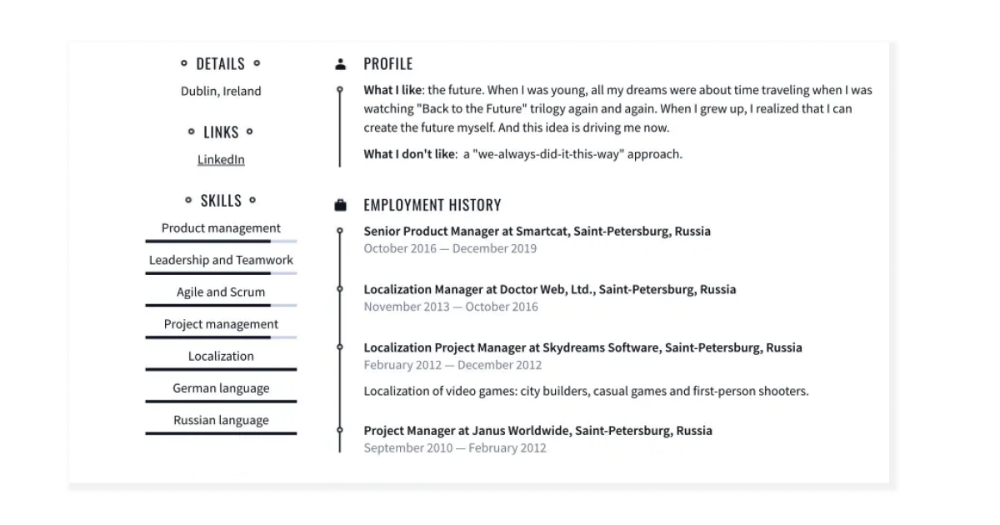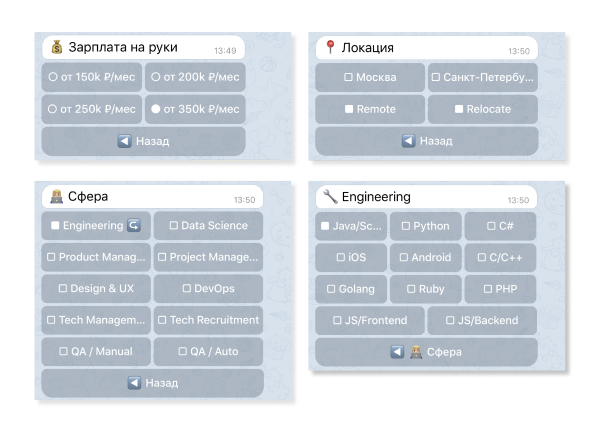
Hello, Habr! My name is Pasha Doronin and most of my life I work in the translation and localization industry. I worked for Smartcat for a long time, where I went from an analyst to a product manager. A few months ago I moved to Dublin and decided to pursue my career further.
This time I decided to change the job search scheme - before I just looked at what is, and chose interesting options. Now I wanted to proceed from what I want to get in the new place, and already filter the ads accordingly. During the period of active search, I contacted 17 companies from Europe and the United States, and got a job at AI-startup Intento (recently raised a new round of investments ). Here's what I understood from this process.
Introduction: Forming Job Requirements
For the first time in my life I decided to approach my job search in an adult way: I made a retrospective of my past searches, compared what I wanted and what I got. I wrote out many points for myself and chose the three most important ones - they formed the basis of my search. They are, in order of priority, from most important:
- Hiring manager. This should be a person from whom I can learn. Not just a boss giving out tasks, but a person who helps me grow. This is what I always expected from myself, working with people in my teams.
- Company vision. The company must have a clear vision of its activities, a mission that I must share.
- Space to grow. I didn't want to do what I had done before. My future dream job should provide an opportunity to do things that I have never done before.
After that, it became somehow easier to understand, even from the job description, whether it is worth sending a resume or not.
Types of employers in IT: personal experience
By the way I work with candidates, I would single out two types of companies - some use career portals, while others do not. For those who use the process, the process is most often verified and generally predictable in time - usually it takes no more than two weeks. By career portals, I mean not Applicant Tracking System, where resume submission is automated, but the applicant's personal account, where you can monitor the status of your resume, see what the next step will be and read additional materials about the company.
However, there are exceptions. For example, Autodesk uses a career portal, but now you submit your resume and never know what's wrong with it. And then after 3 months you will receive an unexpected answer that you have chosen another candidate. Companies that do not have career portals usually either respond immediately or never respond at all.
The interviews themselves are usually quick. Screening lasts the longest - when your resume is considered and they think about whether to invite you for an interview.
If a person does not have the most demanded specialization or strict requirements for an employer, then I would lay at least two months for job search. It took me 3 months of active searching, but this is adjusted for COVID, because I was looking for a job in the midst of the epidemic.
During the period of active search, I contacted 17 companies, of which:
- 9 companies did not respond at all.
- 4 companies refused at the screening stage (one of the refusals was even if there was a recommendation and a referral link from an employee, so the presence of such things is not a guarantee of success either)
- 4 of them were invited to talk
Of these four:
- 1 company didn't return after first interview and stopped responding.
- in two companies (Amazon and Microsoft) I went through all the stages, but was refused.
- I spoke with my current company twice
The processes at Microsoft and Amazon seemed to me the most enlightening, so I would like to compare them in more detail. Let me remind you that I applied for the position of a program manager - this was the name of an interesting position in both companies.
Amazon interviews: 7 interviews, test, leadership principles
I sent my resume through the website, received a response after 2 days and the process itself took about 10 days. Before sending the resume, I knew practically nothing about how they work there, I was very curious to talk to them. There was also a Program Manager vacancy in the localization team. I saw it as a start for growth within the company - I was inspired by the fact that Mike Bundy, director at Amazon Worldwide Operations, came to the company as a temporary warehouse worker .
In total, I went through 7 interviews in this company:
- one screening with HR;
- one interview with a hiring manager;
- session of 5 interviews with different people.
In addition to the interview, there was also a test task: it was necessary to describe an approach to assessing the quality of translation made by external providers. Moreover, there was almost no context.
In interviews, they hardly asked about professional skills at all, all interviews revolved around Amazon's leadership principles . Each of the interviewees had a set of different principles and, as it were, "tried on" you to them. Some turned out to be straightforwardly virtuoso, some clumsy. In a couple of interviews, there were people I would never have met at Amazon if I had started working there - for example, a warehouse manager. As I understand it, they are called in to independently evaluate a candidate regarding principles. I learned these principles and prepared cases from my career for each of them.
In general, Amazon has a very clear hiring process and it is always clear when the next stage will be, how many stages there are. Recruiters always send in materials so that you can better prepare for each stage. The impression from the process itself remained good, but there was a feeling that I probably didn’t want to work at Amazon - there was something in the preponderance of culture over people, which resembled religion.
Result : I went through all the steps, but was refused. The recruiter told me that Amazon doesn't give feedback or give reasons. Well. Guessing is probably not the best option. I continued to search.
Microsoft: 5 interviews, no test cases, friendly atmosphere
The process began with the recommendation of a friend: I received a referral link from the Microsoft career portal, where I registered. From that moment it took only 5 days for the answer.
It was interesting for me to work in a company that has left a mark not only in the history of mankind, but also specifically in my life from the first moment when I touched MS DOS and Windows 3.11 at school. There was a very interesting project for me at Microsoft and I interviewed him for the vacancy of Program Manager, because Microsoft does not have projects or products, everything is Program Manager .
This time I had to go through 5 interviews:
- one screening with HR;
- session of four interviews with managers.
Perhaps, if not for the recommendation, there would be more stages. There was no test task as a separate stage, they offered to analyze several cases right during the interview. For example, describe how I would make a service for learning foreign languages without development.
All interviews were more like friendly conversations - employees willingly talked about the company, about the challenges, about the changes in the company's culture after the arrival of Satya Nadella. Overall, I felt like the people at Microsoft were enjoying their jobs and opportunities. The three people who interviewed me have worked for the company for over 20 years. And I asked them what has been holding them back for so long? They all replied that at Microsoft everything is arranged in such a way that you can constantly start doing something new.
I feel the hiring process at Microsoft is a little less clear than at Amazon, but overall very good. I learned a lot of interesting things at the interview and I really liked the company itself as an employer - first of all, the attitude towards people and the way employees sincerely love their work. I didn't think this was possible in a corporation. If I look for work again, I will definitely send my resume to Microsoft again.
Result : I went through all the stages and my competencies did not coincide with those that the guys were looking for. I received a very detailed email from the hiring manager where he told me about his impressions. It was a very cool experience even though I was not hired.
How I prepared for interviews
I want to share not only my impressions of the processes of different companies, but also my tactics of preparing for interviews for the position of a project manager. It is important to understand that my search fell on not the most successful time of the pandemic: as soon as I decided that I had a rest, gained strength and knew what I wanted, a global crisis began. Many companies announced a hiring freeze and just stopped hiring, interviews began to take place on Zoom. I remember when I left my last offline interview at Microsoft, the interviewee and I were at a loss, should we shake hands or what would it be like now? A week later, all of Microsoft was sent home.
So, here's how I prepared for interviews in the new environment:
Before submitting my resume, I looked to see if I have friends in the company who can make a recommendation. Or I would find hiring managers and see if I have common acquaintances with them. If so, asked them to recommend me. I tried to get an impression of the manager and the company from publicly available sources.
The fact that I was on the other side of the table for interviews many times last year helped in general - you already imagine that you are not the only candidate and are trying to make a short pitch, from which the company will understand everything quickly.
I remember how I myself did not like, for example, long resumes of 4 pages - I simply did not have time to read them in full. Or unprepared stories about cases from past works.
So I made myself a laconic resume using resume.io, wrote out cases of successes and failures (this is important), wrote them down in a notebook and spoke to himself several times. As a result, at any interview, I could give a well-prepared example . I was also advised by the Pramp service , where you can train with the same candidates and go through interviews with each other, giving feedback after that. It seemed interesting to me, but I did not dare to try it. Put it in your bookmarks. If I could find out more information about the interviewee, did it. This is me looking at all the opportunities that have opened before me


Where and how to look for vacancies
I've tried different approaches. I signed up for mailing lists of career portals, talked to recruiters who constantly knock on LinkedIn, and found out about the opportunities in my network of acquaintances. I even tried a non-standard version - I made a video summary like Barney Stinson's in How I Met Your Mother. I ran along the beach like an 80s screen saver, and the credits told about me. I even wrote the music myself in the same style.
It worked well, the video was watched over 1200 times, and I received almost a dozen messages inviting me to chat.
From other methods, there is an interesting Telegram bot g-mate (@ g_jobbot ). There is a simple scheme - you need to connect it, indicate your skills, desired salary, distance / city, and then get vacancies.

Conclusion: Two Top Tips for Job Applicants
The main tip that helped me a lot is a tweet from Gumroad founder Sahil Lavingia. I still have a screenshot of this tweet on my desktop.
Submit your resume - But I don't have enough experience! - As well as the one who will eventually be hired. So Submit Your Resume
Second tip: don't take rejections after interviews (or even after submitting your resume) as a tragedy. Rejection is an integral part of the process. If the company refused, this does not mean that the candidate is bad, it means that you need to keep looking and, if you are lucky enough to receive feedback, analyze it and keep improving yourself.
That's exactly what I did, and as a result, I've been working as a product at Intento for the third month now. My new job meets all three criteria from the beginning of the article. I was familiar with Intento long before I came there, I always liked what they did, and we even had the opportunity to work together on joint projects in Smartcat. And this is very cool!
I like everything, and I'm already looking for a product to join my team - so you know what to do.